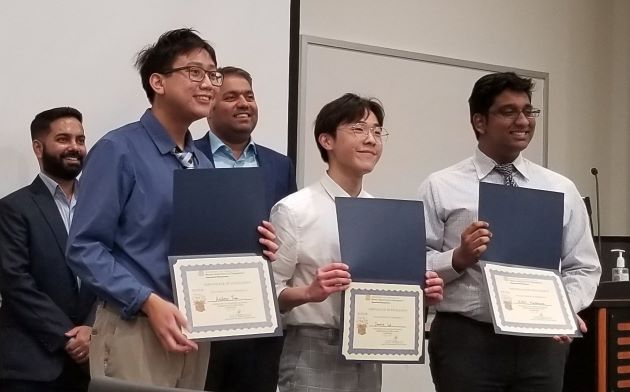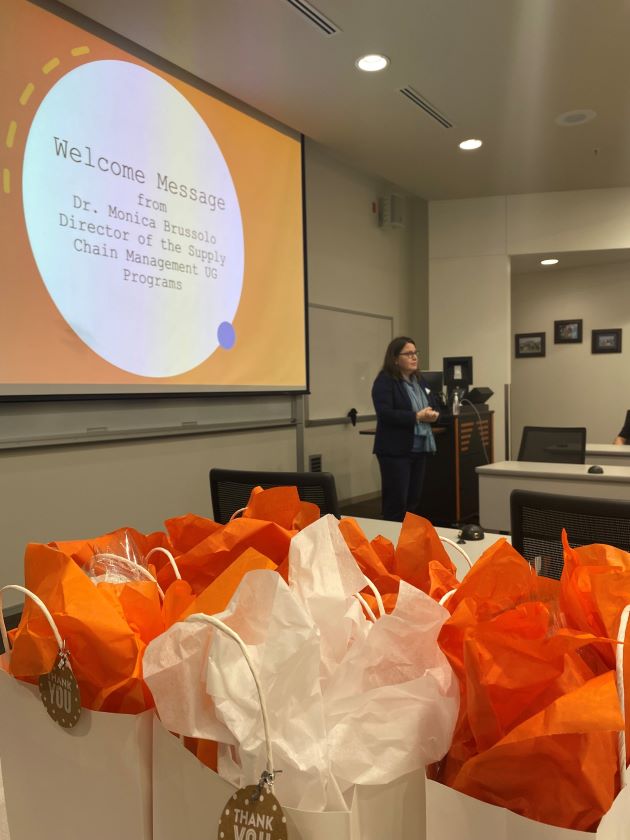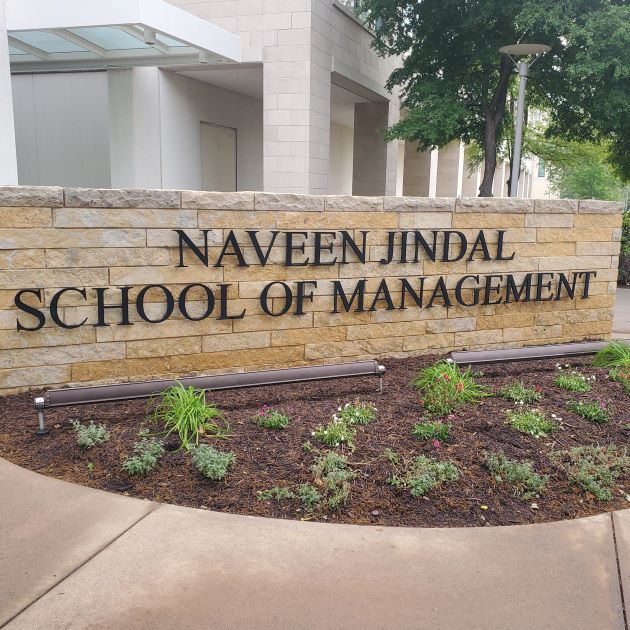![[descriptive alternative text]](/jindal/files/2023/04/supply_chain_competition_april_2023_630x361.jpg)
Five teams of students from The University of Texas at Dallas recently competed in the second annual Out-of-the-Box Supply Chain (SCM) Problem-Solving Competition at the Naveen Jindal School of Management.
The competition, organized by JSOM’s Bachelor of Science Supply Chain Management (BS SCM) STEM program with the collaboration of faculty members from the Operations Management (OM) Area, was open to all UT Dallas students. A total of 53 students representing three UT Dallas schools — the School of Economic, Political and Policy Sciences, the Erik Jonsson School of Engineering & Computer Science, and the Jindal School — registered 22 teams. Out of those, 13 teams comprised of 35 students submitted final reports.
The judging panel consisted of Becky Taylor, director of business development for Caterpillar; Rajarshi Ghose Dastidar, MS’17, manager, AI & Data Engineering at Deloitte; Vaibhav Bakshi, senior manager, AI & Data Engineering at Deloitte; and Ramesh Subramoniam, clinical associate professor and director of Undergraduate Research at JSOM.
The judges selected five finalist teams based on the quality of their reports and the creativity of their analyses. Teams and student members were:
- Shazam: Abdullah Hasani, a BS computer science student, and Zain Mallick, a BS finance student.
- J&J: Tzu-Wei Chuang, a BS SCM student; Jennifer Vu, a BS SCM student and Khushi Goyal, a BS business administration student.
- Green Team: Funmi Meshioye, a BS SCM student; Rosemary Enoidem, a BS human resource management student; and Sarah Gifford, a BS business administration student.
- The 2008ers: Aidan Hawkins, a BS marketing student; and Justin Tiao, a BS accounting student.
- Sakura: Nikhil Maraboyina, a BS computer science student; Andrew Tran, a BS finance student; and Dennis Lo, a BS finance student.
Finalists were given five questions that they were required to answer in their analysis. They also had to report on a sustainability case that was provided to them. The case focused on a company, Kijani Ecoware, producing eco-friendly cutlery for a new market in a developing country. Bagasse, the dry pulpy residue left after the extraction of juice from sugarcane, is used to produce plates and cutlery.
Teams analyzed the company’s possibilities and challenges and made recommendations about its supply chain and its sustainable products. Students’ reports were judged on the depth and completeness of their analysis.
Among the issues students addressed were manufacturing locations and costs; making the product economically feasible for very low-income consumers; how taxes could affect the firm’s economics, identifying target markets such as tourists and foreign-owned businesses; options for manufacturing locations and supplying their products; and additional items that could be added to the company’s line of products.
Teams were given 12 minutes each to make their presentations with three minutes to answer questions from the judges.
Before announcing the competition’s winners, the judges said they were impressed by the presentations and the high level of professionalism shown by the presenters.
“What stood out was the clarity of thought in their analysis, presentation, and grasp of supply chain concepts,” said Dastidar, who graduated from UT Dallas with a master’s degree in SCM.

First place and an $800 prize went to the Sakura team. The Green Team took second place and received an award of $500.
Sakura team members Dennis Lo and Nikhil Maraboyina said their team devoted about four hours per day for a week to completing their presentation.
“It was great to be able to share our ideas for innovations with others,” Lo said.
Although they didn’t win, Aidan Hawkins and Justin Tiao, the 2008ers team, agreed that participating was a valuable experience.
“It was a great experience, and it will be a good thing to add to our resumes,” Hawkins said. The pair worked on their presentation for about a week and a half.
Khushe Goyal, a member of the J&J team who is planning a career in supply chain management, agreed.
“I will be able to apply what I learned from working on this and from listening to the other presentations in my career.”
SCM is the practice of managing a network that links suppliers, manufacturers, distributors, wholesalers, retailers and end-users to provide goods and services. It offers promising job prospects for graduating students and wide-ranging applications across multiple industries, including banking, food, healthcare, manufacturing, retail, telecommunication, transportation, automotive, aviation, gaming, defense, sustainability and many others.

While challenges with the supply chain due to complications caused by the pandemic have been in the news, it is an increasingly popular career choice for many students, according to Dr. Monica Brussolo, an associate professor of instruction in OM and the director of the BS in SCM program at the Jindal School.
“It is a relatively new and vibrant field for businesses,” Brussolo said. “It gives students from different backgrounds and majors the opportunity to solve an interesting yet challenging supply chain case (in this competition) which allows them to learn more about this field. Also having the opportunity to present their conclusions to an industry panel in a concise and effective way, prepares our students for the job market, giving them the right tools to succeed.”
She described graduates of the program as “hot commodities” in the job market, with the majority having secured a job by graduation or right afterward — with competitive offers. According to a recent exit survey, the average salary of a recent graduate is $76,000. Some of the companies that hire Jindal School students are Toyota, Dr Pepper, Raytheon, and Texas Instruments in a variety of roles in strategic procurement, project management, production and operations.
The U.S. Bureau of Labor Statistics forecasts that supply chain-related careers will increase by 30 percent between 2020 and 2030, with a median salary of $76,270 annually.
“Organizing this competition is one of the highlights of the year for my department, as we witness the outstanding job of our students in their submissions and their commitment to preparing for this competition,” Brussolo said. “This opportunity allows them to demonstrate their analytical and soft skills, showing their capacity to manage multiple projects and deadlines, which are excellent skills to succeed in the job market. This experience shows them how interesting it can be to work in supply chain management.”





